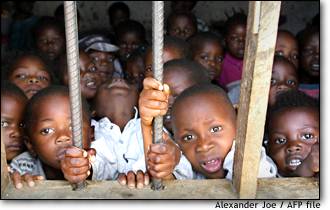AIDS creates global orphan crisis
.
Children orphaned by the AIDS epidemic peer through the window of the Tithanizane Orphan Care Center in Ndirane township, the biggest shantytown in Malawi
 |
.
BARCELONA, Spain, July 10 — Painting a grim portrait of
street children rummaging through trash cans in search of food, the
United Nations on Wednesday predicted that more than 25 million
youth will have lost at least one of their parents to AIDS by 2010 —
nearly double the number today. In the four hardest hit countries of
Africa, one in five youngsters will be orphans at the end of the
decade, the report said. |
.
THE HIV EPIDEMIC is creating “a crisis unprecedented except
in times of war,” said Dr. Peter Piot, executive director of
UNAIDS.
Making matters worse, being an AIDS
orphan carries a stigma as infectious as the virus itself, said Piot. “If
your father died in war, you’re a hero. He died of AIDS, you’re [an
outcast].”
That’s why UNAIDS, UNICEF and
USAID, which jointly released the “Children on the Brink” report here at
the International AIDS Conference, want to get the word out. Their hope is
that the shocking figures will propel efforts to turn the tide.
“It’s important to keep the momentum going,” said
UNICEF chief Carol Bellamy. Already, she noted, the organizations are
helping to fund 75 programs in 22 countries that work with children
affected by HIV.
The programs aim not only to provide orphans with a
roof over their heads and food on their plates, Bellamy said, but also to
ensure the youngsters attend school and have access to health
care.
Children whose parents become ill
often are forced to leave school to care for them or get a job to support
the family, she explained.
FAMILY
SUPPORT
The best way to deal with the
crisis is not to place the children in costly orphanages where they know
no one, Bellamy added, but to support their extended families and
communities to help them cope.
The alarming
projections are already compelling young people whose families or friends
have lost parents to AIDS to get involved. Taiwo Benson told MSNBC.com
that his organization, the Prevent AIDS Society of Nigeria, “provides
food, school fees, anything a child needs to get on with his
life.”
Then there are other needs to fulfill, the ones that don’t
carry a price tag. Sean Cox, head of For Us! NorthWest, said his Portland,
Ore.-based group “gives kids a chance to be kids.
“We were started by kids affected by HIV, for kids affected by HIV,”
said Cox, whose father is HIV-positive. “There are support groups,
recreational activities, even trips to Cirque de Soleil.”
Piot said such programs provide an immeasurable service, as
the vulnerable children try to replace the love they have lost. In the
hardest hit areas, “even kids who have not yet lost a parent worry what
will happen to them if they do. The strains on children who have been
orphaned are even more tremendous.”
SKYROCKETING RATES
Among
other findings of the report, which its authors termed the most
comprehensive statistics yet on AIDS orphans: In 2001, there were 13.4
million children alive in the developing world who had lost their mom, dad
or both to the disease. About 85 percent of these children were in
Africa.
In 2010, 20 million African children — or almost 6 percent of all African
youth — will have lost a parent to AIDS. That’s almost double the current
11 million orphans.
In 2001, about 2
million Asian children had lost a parent to AIDS. But with HIV infection
rates in highly populous countries such as China projected to skyrocket,
so too are the number of AIDS orphans there.
The report covered Africa, Asia and Latin America and
the Caribbean, home to 90 percent of HIV infections, Bellamy said. AIDS
orphans were defined as children under 15 who had lost at least one parent
to the disease.
Neil Monk, a social
scientist at the Association Francois-Xavier Bagnoud, said the figures
vastly underestimate the true number of AIDS orphans. His projection: A
staggering 100 million children will have lost a parent to the disease by
2010.
“The report uses a cutoff of age 15 in
defining AIDS orphans - an arbitrary number that has nothing to do with a
child’s circumstances,” said Monk, who readily admitted he is not a
statistician.
“But I’ve met kids in Uganda
who are 20 and orphaned,” he said. “They’re still in primary school, not
because they are stupid but because they had to delay their education
after losing a parent to AIDS.”
USAID’s Karen Stanecki explained the use of age 15 as a cut-off, “because we’re using demographic information that breaks the data up into predetermined age groups. It’s the best available data we have.”
The bottom line: “There are going to be huge numbers of
orphans, in the tens of millions, perhaps hundreds of millions,” said Dr.
Helene Gayle, who heads HIV efforts at the Bill and Melinda Gates
Foundation. “The figure itself doesn’t really matter as long as you know
what definition you are using.
“We talk so
much about people who are infected, we forget about those who are
affected,” she said. “That’s the point, to find ways to give these
children as normal a life as possible.”
Charlene Laino is MSNBC’s
executive health editor..